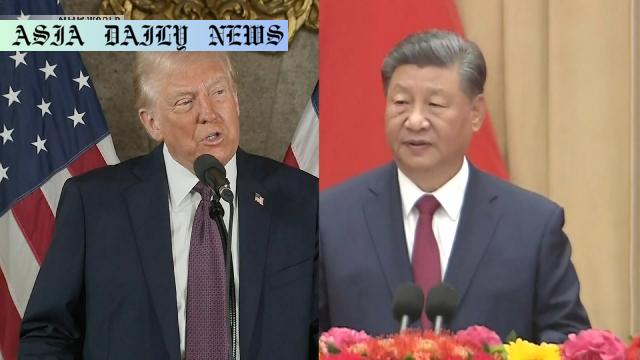Trade – President Trump and President Xi are expected to discuss trade disputes this week as tensions between the US and China remain high.
Key Point 1: Trump and Xi expected to discuss trade over a phone call this week.
Key Point 2: Both leaders aim to resolve trade friction amidst escalating tensions.
Key Point 3: Critical mineral exports remain a major issue in the stalled trade deal.
Key Point 4: US Trade Representative continues daily discussions with China’s team.

Introduction: Trade Talks Between Trump and Xi
The longstanding economic tensions between the United States and China continue to draw global attention. Both nations, being economic superpowers, have experienced friction over trade agreements and tariffs. This week, US President Donald Trump and Chinese President Xi Jinping are expected to discuss these pressing matters through a phone call. Given the significance of their previous agreements—and the allegations of violations by both sides—the outcomes of this conversation could potentially influence global economic markets.
The Background of the Trade Conflict
Trade relations between the US and China have been turbulent over recent years. In May, both countries held talks in Geneva, which resulted in a tentative deal. The agreement outlined commitments from both sides to reduce increased tariffs by 115 percentage points. Despite this progress, the implementation of the deal has met significant obstacles. The United States has accused China of delaying or blocking the export of key products, particularly critical minerals, that were explicitly part of the agreement.
US Accusations and Escalations
President Trump has not hesitated to critique China publicly, accusing Beijing of “totally violating” the trade agreement. This statement reflects the growing frustration within the US administration over what it perceives as bad faith actions by China. Kevin Hassett, the director of the White House National Economic Council, appeared on ABC recently and emphasized the importance of a direct conversation between Trump and Xi to address these issues. Additionally, US Trade Representative Jamieson Greer and his team have reportedly been in daily contact with their Chinese counterparts to progress the talks, signaling the high stakes involved in restoring the deal.
China’s Perspective and Economic Implications
For China, the trade issue involves balancing its economic ambitions with diplomatic pressure from the United States. Critical minerals, for instance, play a vital role in China’s industrial and technological growth. From China’s perspective, its delay in exporting such products might originate from domestic priorities or logistical constraints. However, such actions could provoke retaliatory measures from the US, escalating the trade conflict even further and creating uncertainty in the global economy.
What to Expect From the Trump-Xi Call
The anticipated call between Trump and Xi provides a unique opportunity for progress. The dialogue is expected to focus on addressing existing grievances, particularly around the violation of trade terms and the export of critical minerals. Experts note that the tone and conclusions of this call could set the stage for either a resolution or further intensification of trade tensions. With global industries reliant on the stability of US-China relations, the outcome of this interaction is likely to have significant implications.
The Global Ramifications of US-China Trade Friction
Trade disputes between these two economic giants inevitably ripple through the global market. Tariff increases and export limitations affect supply chains, manufacturing costs, and international investments. The ongoing trade conflict underscores the interdependence of economies in the modern world. Observers argue that resolutions require strategic diplomacy and mutual concessions from both sides. As Trump and Xi prepare for their critical conversation, businesses, policymakers, and citizens worldwide await the results with keen interest.
Conclusion: Moving Forward?
While optimism surrounds the upcoming discussion between Trump and Xi, significant uncertainties remain. The United States and China must address deeper structural issues to forge a durable and mutually beneficial relationship. Both leaders carry the weight of their respective nations’ expectations, making their engagement this week an essential moment in international affairs. Whether the trade impasse will ease or escalate further is a question the world eagerly awaits to answer.
Commentary
The Stakes of US-China Trade Talks
The ongoing saga of US-China trade relations continues to capture the world’s attention, and for good reason. These two economic powerhouses have intertwined their fates in ways that influence everything from supply chains to stock markets. While the tension has been high, the upcoming dialogue between President Trump and President Xi might allow both sides to work toward a meaningful resolution.
Optimism Versus Realism
On one hand, there is reason for cautious optimism. Both nations have demonstrated a willingness to engage in regular discussions, signaling acknowledgment of the importance of resolving the conflict. On the other hand, the repeated allegations of bad faith actions—especially surrounding critical mineral exports—highlight the difficulties of reaching a consensus. The economic stakes are matched only by the diplomatic challenges inherent in these trade negotiations.
The Broader Implications
What makes this conversation so crucial is the broader impact of US-China relations on the world. From manufacturing hubs in Asia to tech companies in Silicon Valley, people are keeping a close watch on every development. The global economy thrives when major players work in harmony, and sustained friction between the US and China spells uncertainty for everyone. As this week’s events unfold, it is critical for both nations to prioritize mutual agreement over stalemates and hostility.
Looking Ahead
One thing is clear: the Trump-Xi phone call has significant implications, not just for their respective nations but for the global economic order. Solutions may not appear overnight, but incremental progress could ease tensions and rebuild trust. Let us hope that this dialogue lays a foundation for more constructive discussions in the future.


